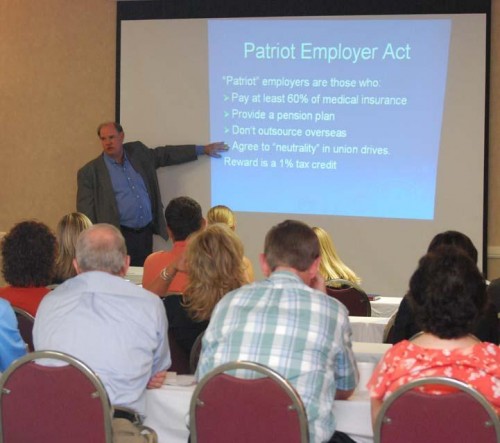June 30
June 30, 2009
Elsie Rhodes Theriot Andrews
July 2, 2009The Employee Free Choice Act, now being debated in Congress, is unfair to employers, said New Orleans attorney Keith Pyburn Jr. speaking in Houma last week at an event hosted by the South Central Industrial Association.
“It’s a one-sided Act,” he said.
Better known as “Card Check,” the bill would allow unions to represent employees at a workplace if more than half of workers sign a card agreeing to join a labor organization.
Currently, under the National Labor Relations Act, unions hold an election overseen by the National Labor Relations Board 40 days after gaining agreement from at least 30 percent of employees. That time period gives employers an opportunity to convince workers not to form a union, said Pyburn, who has represented management in labor relations cases. Card Check eliminates the campaigning period.
Additionally under the bill, employers and unions have 90 days to come to terms before a mediator is brought in. Following that, if no agreement is reached in 30 days, the two sides have to submit to binding arbitration effective for two years.
Pyburn said this other provision is less known but is as adverse as eliminating the campaigning period.
“The arbitrator may not know about the particular business,” he said, and employees would have no input in contract negotiations.
Card Check has another provision requiring an injunction if an employee claims discrimination, with triple damages for time lost.
“The idea is clear,” Pyburn said. “Make it so expensive they won’t fire the employee.”
The Card Check bill, supported by President Barack Obama, has passed the U.S. House and is being filibustered in the Senate, but Pyburn said he is certain present law will be changed.
U.S. Sen. David Vitter (R-LA) opposes the bill, stating in a release, “The principal purpose of the Card Check bill is to make it easier for unions to organize.”
Workers in Louisiana, a right-to-work state, do not have to join a union after it is established at a workplace.
“Still, unions control pay,” Pyburn said.
Although the rate that unions won certification increased every year between 1998 and 2005, labor organizations feel they are not winning enough, he said. Unions do not like the system and want to get rid of the election period.
“It’s more streamlined but it tramples on the rights of employers,” he said.
Pyburn has a no-nonsense view of labor organizing, arguing that unions are businesses that exist to collect dues and generate money. Only 7.5 percent of the private sector labor force belongs to unions, but labor is more organized among police, teachers and firefighters. Ten years ago, unions made an effort to organize offshore workers, he said.
Eastern states not having right-to-work laws see the open shop states in the South as competition, he said.
Pyburn reviewed possible amendments to Card Check, including eliminating the cards in favor of elections after five days or mail balloting. But mailed ballots, like signing cards, could leave employees open to intimidation by pro-union organizers, he said.
Pyburn also listed other Acts generally opposed by management, including the RESPECT Act, which reduces the number of employees classified as supervisors, adding potential union members, and the Protecting America’s Workers Act, which increases fines for workplace violations and requires employers to pay for all safety equipment;
Other Acts he cited were the Civil Rights Act of 2008, eliminating caps on Americans with Disabilities Act suits; the Patriot Employer Act, which has incentives to keep businesses from outsourcing overseas, and the Working Families Flexibility Act, requiring employers to issue written reasons for rejecting employee demands for accommodations in the workplace.
Following Pyburn, Ray Barker, human resources director at Bollinger Shipyards, said the only way to prevent union organizing is to treat employees fairly and consistently.
Employees can try to form unions, Barker said, but organizers need authorization to enter property and they cannot interfere with the flow of work.
Employers cannot threaten to fire a worker for trying to join a union, but they can require workers to perform. “Employees come to you,” Barker said. “No one’s been shanghaied.”
Employers also can give their opinion that unions are not wanted.
Barker listed several downsides to unions, such as mandatory dues payments. He said potential customers will turn down businesses experiencing problems with unions. Companies attending to union matters are not spending time on production, as well.
“The field is slanted toward unions already,” Barker said.
Millions of workers in the Gulf South are not unionized, he said, and the AFL-CIO will have a presence here whether Card Check passes or not. Echoing Pyburn, he said, “Unions are a business.”
Keith M. Pyburn Jr., a labor and employment attorney for the New Orleans law firm of Fisher & Phillips, explained the effects of the Employee Free Choice Act at a South Central Industrial Association seminar last week. * Photo by KEYON K. JEFF











